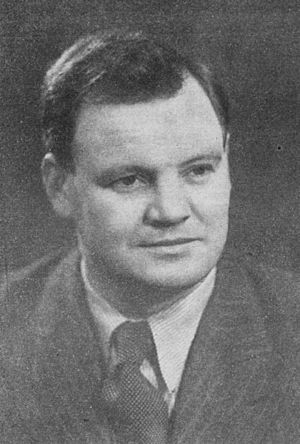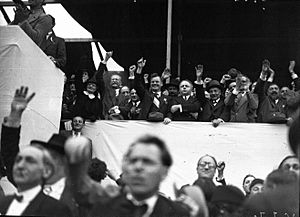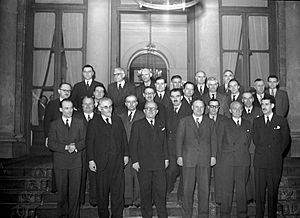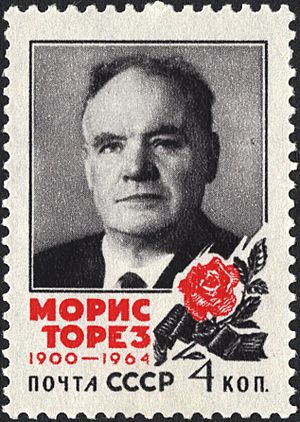Maurice Thorez facts for kids
Quick facts for kids
Maurice Thorez
|
|
|---|---|

Maurice Thorez in 1936
|
|
| Deputy Prime Minister of the Provisional Government of the French Republic | |
| In office 22 January 1947 – 4 May 1947 |
|
| Prime Minister | Paul Ramadier |
| Succeeded by | Pierre-Henri Teitgen |
| In office 24 June 1946 – 28 November 1946 |
|
| Prime Minister | Georges Bidault |
| In office 26 January 1946 – 12 June 1946 |
|
| Prime Minister | Félix Gouin |
| Minister of State | |
| In office 22 January 1947 – 4 May 1947 |
|
| Prime Minister | Paul Ramadier |
| In office 21 November 1945 – 20 January 1946 |
|
| Prime Minister | Charles de Gaulle |
| General Secretary of the French Communist Party | |
| In office 1930–1964 |
|
| Preceded by | Pierre Semard |
| Succeeded by | Jacques Duclos (Interim; 1950–1953) Waldeck Rochet |
| Personal details | |
| Born | 28 April 1900 Noyelles-Godault, Pas-de-Calais, France |
| Died | 11 July 1964 (aged 64) Black Sea, People's Republic of Bulgaria |
| Political party | PCF |
| Other political affiliations |
SFIO (1919–1920) |
| Spouse |
Jeannette Vermeersch
(m. 1947) |
| Signature | |
Maurice Thorez (born April 28, 1900 – died July 11, 1964) was an important French politician. He led the French Communist Party (PCF) for a long time, from 1930 until he passed away. He also served as a top government official, like a Deputy Prime Minister, from 1946 to 1947.
Contents
Early Life and Politics
Maurice Thorez was born in a town called Noyelles-Godault in France. When he was just 12 years old, he started working in a coal mine. This was a common job for many people in his area.
In 1919, he joined a political group called the French Section of the Workers' International (SFIO). He was very active in politics and was even put in prison several times for his beliefs.
In 1920, the SFIO group split, and the French Communist Party (PCF) was formed. Thorez became a secretary for this new party in 1923. By 1930, he became the general secretary, which meant he was the main leader of the party. He kept this job until he died. The leader of the Soviet Union at the time, Joseph Stalin, supported him.
In 1932, Thorez started a family with Jeannette Vermeersch. They had three sons before they got married in 1947. They stayed together until he died.

Thorez was elected to the French parliament, called the Chamber of Deputies, in 1932. He was re-elected in 1936. In 1934, he helped create the Popular Front. This was a special alliance of different political groups: Communists, Socialists, and radical Socialists.
France was going through a tough time because of the Great Depression, which meant many people were struggling. The Popular Front gained a lot of support and won the 1936 election. With the Communists' help, a Socialist leader named Léon Blum became Prime Minister. His government passed many new laws to help people. During this time, the Communist Party grew much larger under Thorez's leadership.
World War II and Resistance
In 1939, a special agreement was made between the Soviet Union and Germany, called the Molotov–Ribbentrop Pact. After this, the French Communist Party was against France's war efforts and was made illegal. The party did not support the Nazis, but they believed the Soviet Union's agreement with Germany would keep Germany from attacking the USSR.
Because the party was seen as hindering the fight against the Nazis, their newspapers were banned. Many party members were also put in special camps. Thorez himself had his travel documents taken away and was drafted into the army.
In June 1941, Germany invaded the Soviet Union. After this, the French Communist Party openly decided to fight against the German occupation of France. Even before this, the party had organized protests against the occupation. They also organized a large strike of 100,000 miners in May 1941.
During the war, articles written by Thorez appeared in the party's secret newspaper. These letters were always signed "Maurice Thorez, somewhere in France." However, it was later revealed that Thorez had actually been in Moscow (the capital of the Soviet Union) for the entire war. While he was away, his second-in-command, Jacques Duclos, managed the party's activities and its resistance movement.
When General Charles de Gaulle's Free French Forces freed France in 1944, Thorez received a pardon. After France was liberated, Stalin told Thorez to lead the Communist Party in a way that would not cause a revolution. Instead of taking power by force, the party was told to give up their weapons. The idea was that the party would become very strong in the government after the war and would soon win power legally.
After the War
In November 1944, Thorez returned to France from the Soviet Union. In 1945, he got his French citizenship back. The PCF became the largest political party in France after World War II. This was because of their important role in fighting against the Nazis during the occupation, especially after 1941. Thorez was elected to the French parliament again and continued to be re-elected during the French Fourth Republic (1946–1958).
In Government

In the 1945 elections, the Communist Party formed an alliance with the Socialist Party. Thorez became a top government official, serving as vice premier of France from 1946 to 1947.
By 1947, the world was entering the Cold War between the United States and the Soviet Union. Also, there were growing problems in France, like wages not keeping up with prices. These issues put a lot of pressure on the government, which included the Socialists, Communists, and another group called the Popular Republican Movement. This led to a big political problem in May 1947.
The United States warned the French Prime Minister, Paul Ramadier, that if Communist ministers stayed in the government, France might not get help from the upcoming Marshall Plan. This plan was a way for the U.S. to help rebuild Europe after the war.
At the same time, there were many strikes in France in 1947. Rumors spread that the Communist Party might try to take over the government by force on May 1st. The Prime Minister secretly worked with the Army Chief to prepare for such an event. The situation also got worse because of the start of a war in Vietnam. Communist members of parliament voted against this war.
All these things led Ramadier to find a reason to remove Thorez and his Communist colleagues from the government. On May 4, the Communist ministers voted against the government's plans to control wages and prices. This was given as the reason for forcing the Communist ministers out of the government on May 7, 1947.
Thorez later talked about what happened in May 1947:
All my colleagues were full of praises and kindnesses for us – they were prodigal with their declarations of appeasement. Ramadier told us: 'I have no reproaches to make of you. You have always been loyal.' And Teitgen came forward to say 'We shall miss you a lot!' They all threw flowers on us, the better to bury us. I knew that Ramadier was cooking up something bad, but never did I think he'd go this far…
In Opposition
In 1950, when he was very popular with his party members, Thorez had a stroke. He stayed in the Soviet Union for medical treatment until 1953. In March of that year, Stalin died, and Thorez was part of the French group that went to Stalin's funeral. While Thorez was away, Jacques Duclos was in charge of the party. Thorez returned to France and continued his work as party leader.
Even though his health was not good, Thorez remained the leader of the party until just before he died in 1964. He passed away while on a cruise in the Black Sea.
In 1937, he published a book about his life called Fils du peuple (Son of the People). He also published Une politique de grandeur française (Politics of French Greatness) in 1945.
A city in Ukraine was named Torez after him in 1964. However, in 2016, the city's name was changed back to its old name, Chystyakove. The Moscow State Linguistic University in Russia was also named the Maurice Thorez Moscow Institute of Foreign Languages from 1964 to 1990.
Images for kids
See also
 In Spanish: Maurice Thorez para niños
In Spanish: Maurice Thorez para niños
 | Dorothy Vaughan |
 | Charles Henry Turner |
 | Hildrus Poindexter |
 | Henry Cecil McBay |


